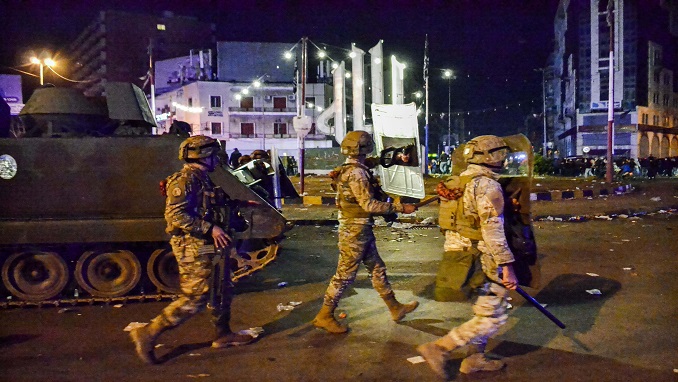Lebanon’s military intelligence has “forcibly disappeared and allegedly tortured” people who protested against lockdown conditions and the deteriorating economy in the northern city of Tripoli, Human Rights Watch says in a report quoted by Al Jazeera.
According to the report released on Tuesday, people detained at protests were tortured and faced “unsubstantiated terrorism charges” at military courts which, under international law, should not have jurisdiction over civilians. In addition to the terrorism charges and alleged torture, the report also highlights violations of due process, forced disappearances and inhumane detention conditions – the prison was reportedly very cold, dirty, and not well ventilated.
HRW said it spoke with five detainees, families of five protesters, two lawyers involved in the case, a judicial source, and Police Commander Major General Imad Othman for the report that focuses on the cases of at least 35 people, including two children.
The group was charged last month by Lebanon’s military prosecutor with “terrorism, forming criminal associations and stealing public property during protests” in Tripoli at the end of January, HRW reported. The report quoted 34-year detainee Ali Hashem as saying that military intelligence officers “beat, slapped, and kicked him while he was blindfolded and handcuffed”.
Enforced disappearances
Four of the 35 charged remain in detention and 19 have been released. Quoting lawyers working on the case, the report says “authorities have refused to identify the other 12 defendants, citing the ‘secrecy’ of the investigations”.
“I didn’t leave a person or a place that I didn’t ask,” said the mother of one of the detainees, 28-year-old Tarek Badawiyyeh. “But no one knew… I thought maybe someone beat him or killed him, you know the situation in the country. For three days, I was living in hell. I thought my child was gone.”
The report said that the majority of the detainees were also denied the right to have a lawyer present during their preliminary interrogations. Five of the detainees said in the report that they were not given adequate material to clean themselves or their cells, creating conditions conducive to the spread of COVID-19.
Repression, torture
Tripoli was already one of Lebanon’s poorest areas even before the pandemic piled new misery onto a chronic economic crisis. Many of its residents were left without an income since Lebanon imposed a full lockdown in early January in a bid to stem a surge in COVID cases and prevent its hospitals being overwhelmed.
Government aid was promised but did not materialise, pushing the majority of the city’s residents into abject poverty.
“Lebanese authorities should address the legitimate grievances of people in Tripoli but instead they’ve escalated repression against a population fighting for a dignified life,” said Aya Majzoub, Lebanon researcher at HRW. “The government needs to answer for disappearing and any torture of detainees and drop all unsubstantiated terrorism charges against them.”
Lebanon passed an anti-torture law in 2017, but human rights organisations have since routinely reported incidents of torture in the country.
“The authorities have failed to properly investigate the allegations, and justice for torture in detention remains elusive,” said HRW in its report.
The HRW said in the report that the army did not respond to a request for comment.
The allegations come a day after Lebanon’s prosecutor general Ghassan Oueidat ordered a probe into the alleged torture of more than 20 Syrians in custody following a report by Amnesty International. In the report, published last week, Amnesty accused Lebanese authorities of “cruel and abusive” treatment of more than 20 Syrians it said were tortured in prison or during interrogation.
In particular, it blamed Lebanon’s military intelligence bureau and said the abuse was mostly at a military intelligence centre in east Lebanon’s Ablah district, the General Security bureau in Beirut or at the defence ministry.
